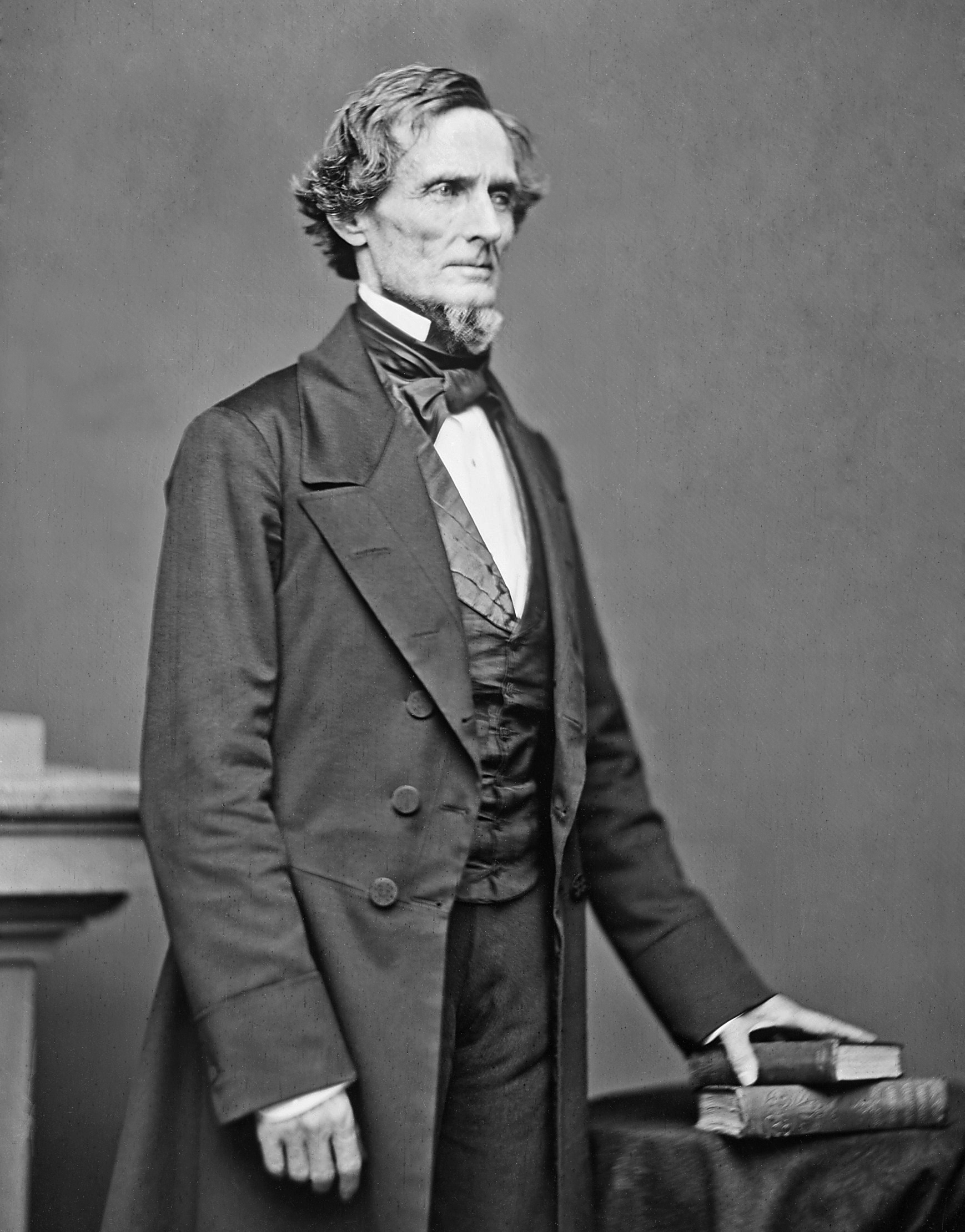Jefferson Finis Davis
 •
by
•
by General Stonewall Jackson

Jefferson Finis Davis (June 3, 1808 – December 6, 1889) was an American statesman and leader of the Confederacy during the American Civil War, serving as President of the Confederate States of America for its entire history, from 1861 to 1865. Davis was born in Kentucky to Samuel and Jane (Cook) Davis. After attending Transylvania University, Davis graduated from West Point and fought in the Mexican–American War as a colonel of a volunteer regiment. He served as the United States Secretary of War under Democratic President Franklin Pierce. Both before and after his time in the Pierce administration, he served as a Democratic U.S. Senator representing the State of Mississippi. As a senator, he argued against secession, but did agree that each state was sovereign and had an unquestionable right to secede from the Union.
On February 9, 1861, after Davis resigned from the United States Senate, he was selected to be the provisional President of the Confederate States of America; he was elected without opposition to a six-year term that November. During his presidency, Davis took charge of the Confederate war plans but was unable to find a strategy to stop the larger, more powerful and better organized Union. His diplomatic efforts failed to gain recognition from any foreign country, and he paid little attention to the collapsing Confederate economy, printing more and more paper money to cover the war's expenses.
Historians have criticized Davis for being a much less effective war leader than his Union counterpart Abraham Lincoln, which they attribute to Davis being overbearing, controlling, and overly meddlesome, as well as being out of touch with public opinion, and lacking support from a political party (since the Confederacy had no political parties). His preoccupation with detail, reluctance to delegate responsibility, lack of popular appeal, feuds with powerful state governors, inability to get along with people who disagreed with him, neglect of civil matters in favor of military ones all worked against him.
After Davis was captured on May 10, 1865, he was charged with treason. Although he was not tried, he was stripped of his eligibility to run for public office; Congress posthumously lifted this restriction in 1978, 89 years after his death.[5] While not disgraced, he was displaced in Southern affection after the war by the leading Confederate general Robert E. Lee. However, many Southerners empathized with his defiance, refusal to accept defeat, and resistance to Reconstruction. Over time, admiration for his pride and ideals made him a Civil War hero to many Southerners, and his legacy became part of the foundation of the postwar South.
[img]http://upload.wikimedia.org/wikipedia/commons/6/67/Jefferson_Davis_Monument%2C_Richmond%2C_VA_IMG_4066.JPG[/img]


Comments
Samo polako bice nas jos.
Ne daj mu bre drzavljanstvo!!! 😃
Šalim se naravno,Lipec dobro nam došao u eRepubliku Srpsku. Mogao bi da se kandiduješ za predsednika 😛
Jos sest dana i radimo popis u kafani!
Calculate on us!
Veselo! Bravo Lipec, svaka cast!
Opa! Sad više ni ne sumnjam u pobjedu na predsedničkim...glas tog čovjeka vrijedi kao 50 drugih 🙂
E pa sad je stvarno gotovo. 😛
A mi sad svi idemo za Mehiko? 😃DDD
Dobro došao.
Meksiko stižemo! Baš se radujem poseti actečkih lokaliteta i relikvija. 😃
jos da je to Lipec il onaj ko mu sita account xD
Ma ko će to znati! 😃
i sesta.bg nam je dosao.
Molim "deset u pola s' lukom"
i jednu kokakolju naravno
Sad kada smo mi pobedili...Postalo IN biti iz eBiH?
😛PP
Bivsi predsednici eSrbije stigli u banju `Dvorovi` na oporavak i rehabilitaciju!
hehehe
Moracemo da uvedemo tu praksu za buduca vremena.
Cim ti se predsedniku zavrsi mandat u eSrbiji, pravac eBiH, eDanska ili eMalezija.
hi hi
Predsednice K, cim obrises ehrvatsku dodji ceka te pasos!
Svi su dobrodošli mada su mogli doći malko ranije. 😃
A Брдар, јел су они прочитали устав еБиХ...
По уставу ...на свечаној инаугурацији приликом примања еБиХ држављанства морају три пута да викну
"ЖИВЕЛА еРЕПУБЛИКА СРПСКА...
ЖИВЕЛА еРЕПУБЛИКА СРПСКА...
ЖИВЕЛА еРЕПУБЛИКА СРПСКА"
И да иду око стола са гибаницома а да ништа не ћапе. ..
... биће после свечаности за све и прасетине и дуван чварци и .....
LOL
P.S. Nikola Milojica истина. 😃
jos jedan pacijent.
СРБИН 😃
Kroz par mjeseci i zaboravice se da su eFederalci postojali 😁)
joj, vi samo metuzaleme okupljate ovdje nedaj boze da se zadesi neko RL okupljanje i da se zapijemo skupa ne bi covjek imao koga da iskoristi...
tko je lipec?
A ko je ovaj iznad mene 😃D
samo nam je on jos falio ...
zanimljivo...
mislim da je svima jasno kuda ovo vodi...
Očito su srbi iz BiH nesposobni imati vlastitog preCjednika, pa regrutiraju iz matice bre
" И да иду око стола са гибаницома а да ништа не ћапе. .. "
Onda Desert ne može da uzme državljanstvo eBiH 😃
Očito su srbi iz BiH nesposobni imati vlastitog preCjednika, pa regrutiraju iz matice bre
sad si ti baja...😃
ps fali ti i ovde 995_pd 😛